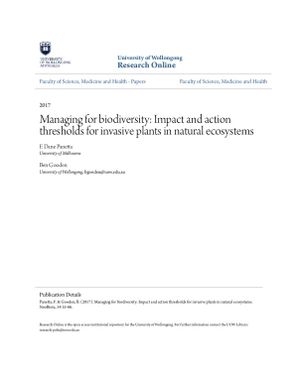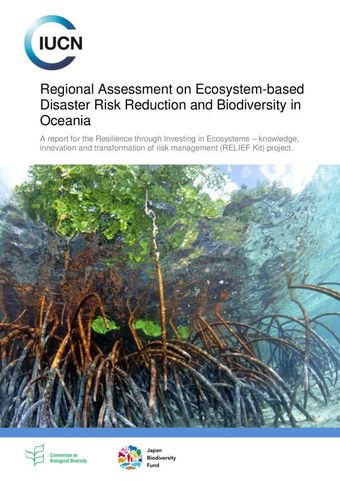Managing for biodiversity: Impact and action thresholds for invasive plants in natural ecosystems
- Description:
- Some studies examining the impacts of invasive plant species in native plant communities have demonstrated non-linear damage functions, whereby community components, such as species richness, are seemingly unaffected by the presence of an invader until it has attained relatively high levels of abundance, whereupon there is a marked decrease with further increases in abundance. Given chronic limitations in the resources available for managing invasive species, it has been argued that the most damaging invaders would be controlled most efficiently by maintaining their abundances below such threshold levels. Because many impact studies do not involve sampling over a wide range of invader abundances it is not possible to estimate the prevalence of threshold relationships. Furthermore, studies that have employed appropriate sampling methods have shown that different life forms exhibit different threshold responses, indicating that maintenance management for biodiversity values should be designed to protect the most sensitive species or groups of species. Since control costs increase with invader abundance, economic and ecological considerations are aligned when invaders are sustainably maintained at relatively low abundances. Adopting such an approach should also minimise negative impacts where damage functions are linear.
- Display date:
- 2017
- Collections:
- Secretariat of the Pacific Regional Environment Programme (SPREP)
- Publisher:
- University of Wollongong
- Content partner:
- Secretariat of the Pacific Regional Environment Programme (SPREP)
- Availability:
- Not specified
-
Copyright status: All rights reservedFind out more about what you are able to do with this itemThis item is all rights reserved, with means you'll have to get permission from Secretariat of the Pacific Regional Environment Programme (SPREP) before using it. For more information, please see our use and reuse page.What can I do with this item?Non-infringing useNZ copyright law does not prevent every use of a copyright work, and this item may be hosted by an international institute or organisation. You should consider what you can and cannot do with a copyright work.No sharingYou may not copy and/or share this item with others without further permission. This includes posting it on your blog, using it in a presentation, or any other public use.No modifyingYou are not allowed to adapt or remix this item into any other works.No commercial useYou may not use this item commercially.
Welcome and warm Pasifik greetings
The information on this site has been gathered from our content partners.
The names, terms, and labels that we present on the site may contain images or voices of deceased persons and may also reflect the bias, norms, and perspective of the period of time in which they were created. We accept that these may not be appropriate today.
If you have any concerns or questions about an item, please contact us.

